The 4 Hottest Digital Nomad Cities 2025
Fast internet, good energy, affordable living, and people who get it
I used to think a city is a city.
The people make the vibe, right?
Find good friends, build routines, and any place works. That was my theory for years.
But after living long-term in 7 countries and testing dozens of cities, I changed my mind. It’s more than people. A city either supports the life you are trying to build, or it fights you on it.
Infrastructure that works when you need it. Rent that doesn’t cost half your income. Visa rules that make sense instead of forcing you to leave every 60 days. Coffee shops where people work instead of just taking photos.
Some cities have these basics. Many don’t.
Here’s what we’ll cover:
Five things that make or break a city for remote workers
Four cities that handle these well in 2025
Real costs, visa options, and what daily life actually looks like
Let’s get into it.
What Makes a City “Work”
Five things separate cities that work from cities that just look good online.
Cost of Living
You need to be able to afford the place. Not in a backpacker hostel way, but in a “I can live well without stress” way. Good apartment, solid food, reliable transport. If you’re watching every expense or choosing between comfort and savings, the city fails this test.
Work Infrastructure
Fast internet is obvious. But it’s not enough. Cafés where you can actually work for hours. Reliable power. Good transport so you’re not stuck in traffic when you have a call. The city needs to support getting things done.
Community & Connection
You need people who understand what you’re building. Not just other nomads passing through, but a mix of remote workers, locals, expats, and founders who stick around long enough to form real relationships. Weak communities feel transactional. Strong ones feel like home.
Lifestyle & Energy
How does the city make you feel? Safe? Energized? Inspired? Or drained and stressed? The best cities support your health, habits, and mental space. Access to nature helps. Good food matters. The vibe either adds to your life or takes from it.
Access & Stability
Visa-friendly policies make everything easier. Political stability means you’re not worrying about sudden changes. Good flight connections let you move when needed. If entering or staying legally is a constant headache, the city doesn’t work long-term.
Most cities fail on at least two of these. The ones below handle all five well enough that you can stop thinking about logistics and start building.
1. Bangkok, Thailand
"In Bangkok, nothing makes sense, and yet, everything works."
— Every nomad, eventually
Bangkok is chaos that works.
Nothing makes sense at first. The traffic shouldn’t flow but it does. The street food vendors operate on sidewalks next to luxury malls. The city feels like it’s about to collapse under its own weight, but then you realize it’s been running like this for decades.
For remote workers, Bangkok delivers on almost everything. Fast internet, endless co-working spaces, world-class food for $2, and rent prices that make Western cities look absurd.
What makes Bangkok stand out is the cost-to-quality ratio
Bangkok is loud and fast, which can feel overwhelming at first. But if you are looking for a city that keeps you stimulated and has a great network, Bangkok has both.
Cost of Living
You can live well on $1,700 to $2,200 per month. High-end condos with gyms and pools cost $800 to $1,200. Street food costs $2 to $3 per meal. You can eat at nice restaurants too, but you never have to. Public transport is cheap and reliable.
Most apartments rent for one-year periods. Start your search on hipflat.
Work Infrastructure
Thailand built its infrastructure around remote work years ago. Internet speeds are 300 Mbps or higher in most condos. Co-working spaces are everywhere.
WeWork-style offices in Thong Lo have a more polished “corporate vibe”. Creative spaces in Phra Khanong attract designers and freelancers. Hidden laptop cafés (such as Yellow Lane in Ari) give you the quiet focus space.
I use WeWork. The accessibility and community made sense for how I work.
Community & Connection
There’s a growing tribe of digital nomads, expats, and remote entrepreneurs. You’ll find tech people, creatives, founders, crypto bros (meh), and wellness people all blended in. It takes a little effort to get connected, but once you do, the network effect does its thing. If you are a (social) runner, and keen to meet new people quickly, I suggest you join Asia’s biggest run club for their weekly run on Sundays.
Lifestyle & Energy
This is where Bangkok shines. Want calm mornings with oat lattes and Muay Thai? Or late nights with rooftop drinks and neon chaos? Your choice. Despite the pace, there’s balance here. Access to nature, incredible food, and even decent air quality (in certain seasons, not always). The best park for a morning meditation is Benjakitti Park.
Access & Stability
Thailand is relatively easy to enter, at the same time, Thailand is unpredictable when it comes to visa changes. The newest visa everyone talks about is the DTV (Destination Thailand Visa). It is specifically designed for digital nomads, freelancers, and remote workers. It allows multiple entries and longer stays, offering real flexibility for those who want to base themselves here long-term.
Other options include the Long-Term Resident (LTR) Visa for remote workers and the SMART Visa for entrepreneurs and investors.
Flight connections are excellent. Infrastructure quite modern. Relative political stability. Bangkok works as a launchpad across Asia.
2. Lisbon, Portugal
Laid-back living with a creative pulse.
Lisbon became Europe’s remote work capital without trying too hard.
Cobblestone streets, rooftop sunsets, pastel de nata at every corner. Apart from romantic aesthetics, the city works. Fast internet, solid co-working culture, and a growing flow of founders, designers, and freelancers who decided to stay.
The “Lisbon hype” drove prices up over the past few years. But compared to other capitals in Europe (London, Paris, or Berlin) Lisbon still offers value.
Cost of Living
You can live well on €2,000 to €2,800 per month. Not ultra-cheap anymore, but reasonable for Western Europe. Avoid the tourist-heavy neighborhoods.
Avoid the tourist-heavy neighborhoods like Baixa and Chiado. Your rent drops significantly in areas like Campo de Ourique or Graça.
Start apartment hunting here.
Work Infrastructure
Good Wi-Fi is standard. Co-working spots like Second Home, Heden, and Impact Hub cater to remote workers who want more than just a desk. Cafés work for laptop sessions too (unlike Paris). Grab an espresso, find a corner, get your work done. Nobody bothers you.
Community & Connection
The nomad scene here is huge. You’ll meet founders building SaaS products, designers working for US clients, freelancers running agencies remotely.
Meetups happen multiple times per week. Language exchanges run every Thursday. Show up once and you’ll have three coffee invites by the end of the night.
People stay for months or years, not weeks.
Lifestyle & Energy
Lisbon has 300 days of sun annually. The ocean is 20 minutes by train. People take actual lunch breaks here, not working lunches at their desks.
The pace is slower than most European capitals. If you’re coming from London or New York, you will notice the difference immediately.
Cascais is great for weekend escapes, and only a 30-minute train ride away.
Access & Stability
Portugal is one of the most open, visa-friendly countries in the EU. The Digital Nomad Visa allows stays of up to 1 year (with renewals), and you can even apply for residency after five.
Flights across Europe are cheap, healthcare is good, and the country is politically stable and safe.
3. Hanoi, Vietnam
"Does everybody fall in love with the country like I did? I came here and it stole my heart, you know."
— Anthony Bourdain, chef, writer, and travel documentarian
Anthony Bourdain visited Hanoi in 2016 and said it stole his heart. I understand why. The city doesn’t perform for tourists. It just exists, messy and loud and real.
Cost of Living
You can live comfortably on $800–$1,200/month. Apartments are modern and affordable. Local meals usually cost between $1–$3. You will eat out more than you cook. Get the bánh mì. It’s the best $1.50 ever spent.
Work Infrastructure
Internet is solid and improving. Co-working spaces like Toong and UP offer calm, focused environments right in the heart of the action.
Hanoi has thousands of cafés. Most welcome laptop workers. Buy a $1 coffee, sit for four hours, no one bothers you. The café culture supports remote work naturally.
Community & Connection
The digital nomad scene is smaller here than Bangkok or Lisbon. Fewer structured meetups. Less rotation of new faces every month.
But the people who stay tend to stick around for years. Artists, writers, founders running remote businesses. The community feels less transactional because of it.
Tây Hồ is the main expat neighborhood. Go to the same cafés weekly and you will meet familiar faces. That’s how connections happen here.
Lifestyle & Energy
There’s history in every street, every smell, every sound. It can be overstimulating at first, but once you sync with the rhythm, you start to feel alive in a different way.
Morning walks around Hoàn Kiếm Lake. Bún chả in back alley courtyards. Night rides on a motorbike with no destination. It’s all part of it.
Access & Stability
Visa rules in Vietnam are not great. They change often, and the process is (almost) always annoying. That said, things are improving. The best option right now is the 90-day e-visa, which you can apply for online and extend if needed.
For short-to-mid term stays, it works well enough. Just don’t expect the easiest bureaucratic ride.
Watch official government announcements if you are planning stays longer than six months. Rules change without much warning (similar to Thailand).
4. Chiang Mai, Thailand
Calm, focused, and quietly addictive.
Chiang Mai built itself for digital nomads before the term existed.
The city sits in northern Thailand’s mountains, about 700 kilometers from Bangkok. It moves slower than the capital. Quieter. Less chaotic. But the infrastructure works just as well, and the value for money you get here is hard to find elsewhere.
I lived here for a year.
Could see the mountains from my apartment. I cycled through rice fields on weekends and never stopped being surprised by how little everything cost.
Cost of Living
You can live well on $1,000 to $1,500 monthly. A solid one-bedroom apartment costs $400 to $600. Add $50 for utilities and internet. Great apartments can be found here.
The local food is simple and nourishing (must-try Khao Soi).
Work Infrastructure
This city practically invented the digital nomad café. Internet is fast, cafés are laptop-friendly, and co-working spaces like Yellow and Alt_ChiangMai are built for long, focused sessions. Alt has recently opened a second location close to Ping River, and it’s definitely worth a visit.
Community & Connection
The nomad scene here is well-established. There are meetups, workshops, and mastermind circles without trying too hard. But you can also do your own thing. That balance is part of what makes Chiang Mai so livable.
Expect conversations about online businesses, mindfulness, and life design more than hype or hustle. And if you love cycling, you're in the right place.
Chiang Mai has the largest cycling community in Thailand,
You will find everything from casual rides to serious climbs into the mountains.
Start here: Club 55, a relaxed social space where locals, expats, and nomads casually mix over good coffee (try: Toffee Roasters), live music, and spontaneous conversations.
Lifestyle & Energy
Chiang Mai is slower than Bangkok. The city wakes up later and shuts down earlier. Less traffic, less noise, fewer people.
That slower pace works for some people and bores others. You’ll know within your first few weeks which group you fall into.
Access & Stability
As mentioned earlier in the Bangkok section, Thailand’s expanding visa options apply here too. As for connectivity, Chiang Mai has a small but efficient airport with direct flights across Asia (Japan, Korea, China, Taiwan etc.).
Final Thoughts
That’s it.
Four cities that handle the basics well enough that you can stop worrying about logistics and start building something.
Key takeaways:
Bangkok offers the best infrastructure and community size, but the chaos and noise can be too much for some people
Lisbon costs more than it used to, but has European quality of life with solid visa options and year-round sun
Hanoi is the cheapest option, and feels most authentic, but visa complexity and smaller expat networks make it harder for beginners
Chiang Mai has low cost and the best nature access, but the slow pace drives away people who thrive on big city energy
No city is perfect.
Each one trades something for something else.
Pick one of the 4, try it for a few weeks, and see if it fits you.
Remember, you can always move.
(Which is the whole point of this lifestyle).
If this article gave you clarity, share it with someone that it could also benefit.
And if you have questions about your specific situation, drop them in the comments.
I read them all.
Thanks for reading and being part of this journey,
— Ben
PS
Grab your Move Abroad Checklist (if you haven’t yet).



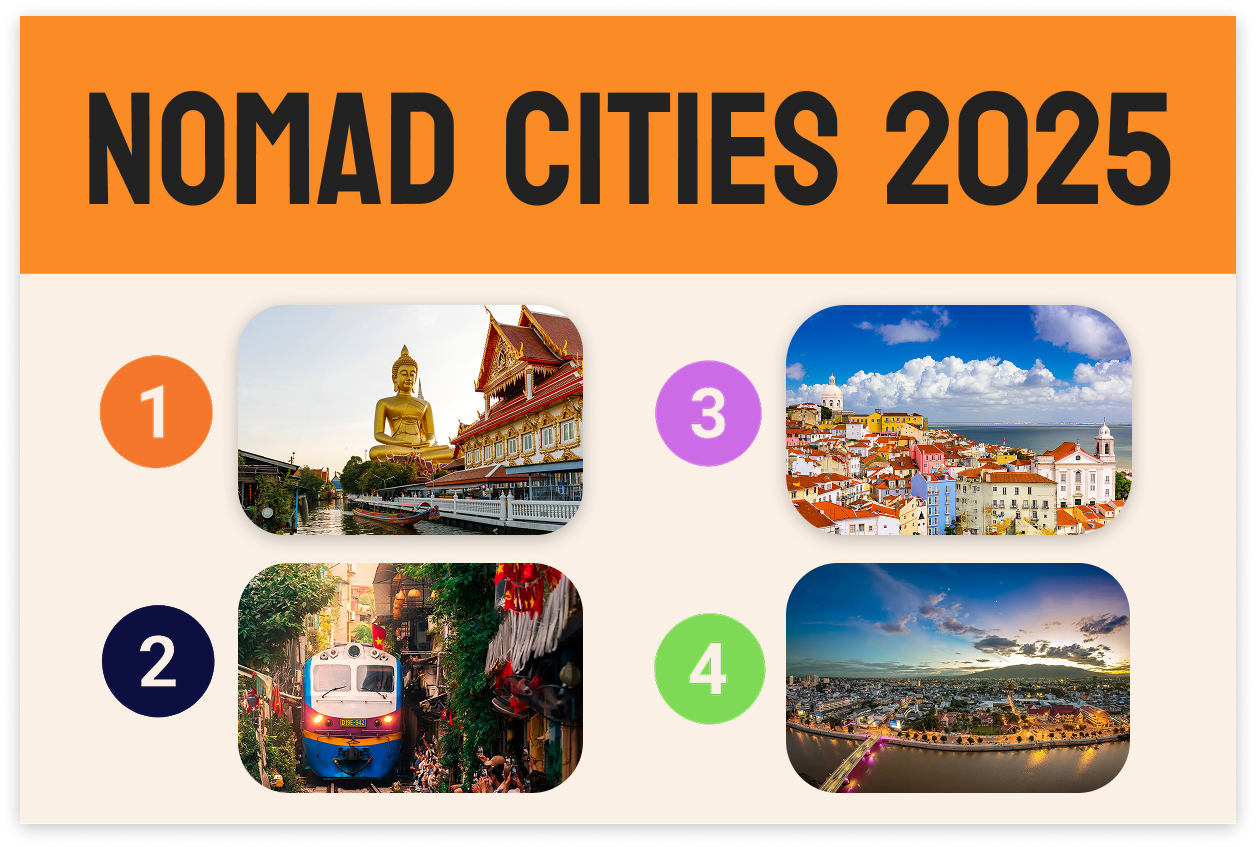

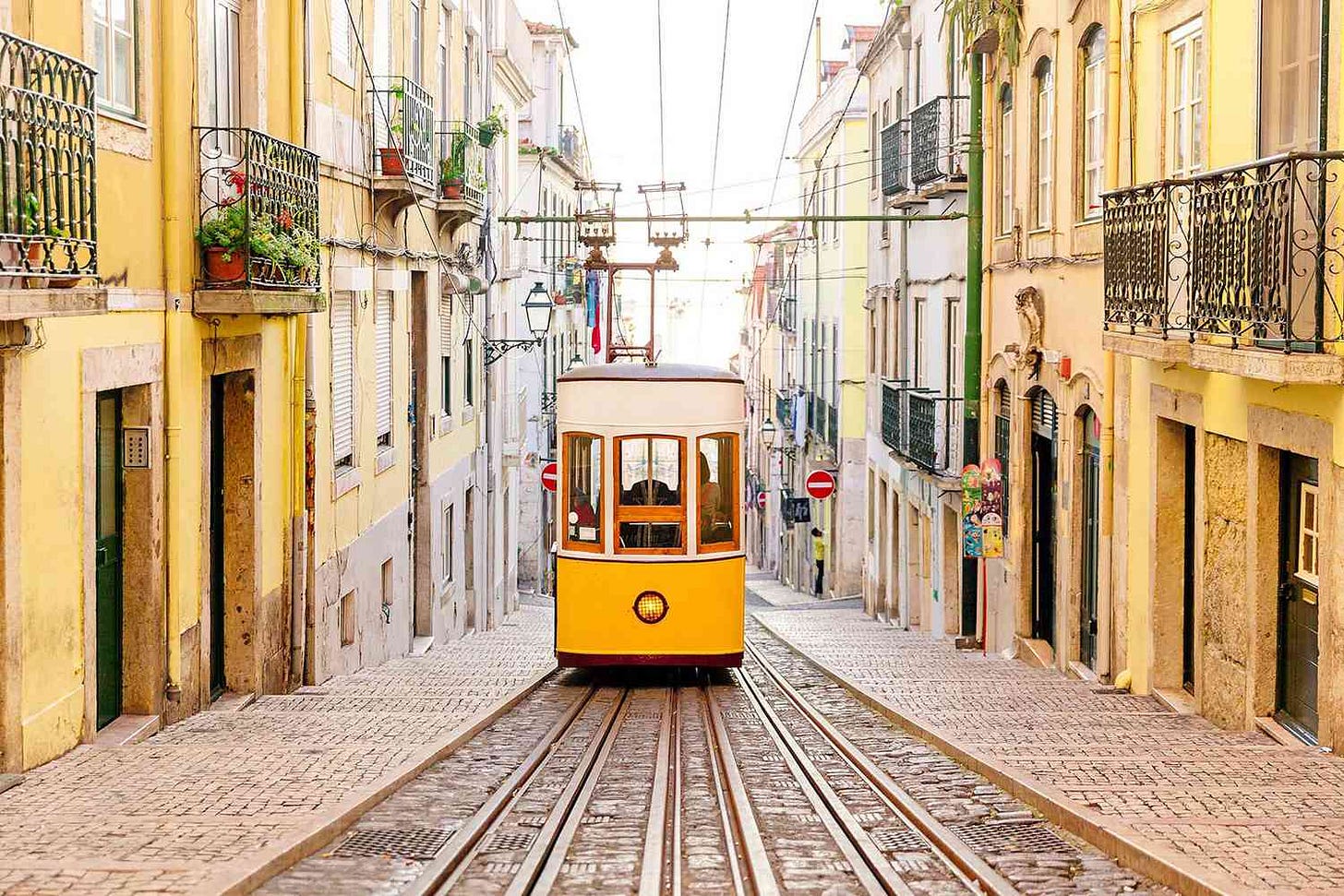
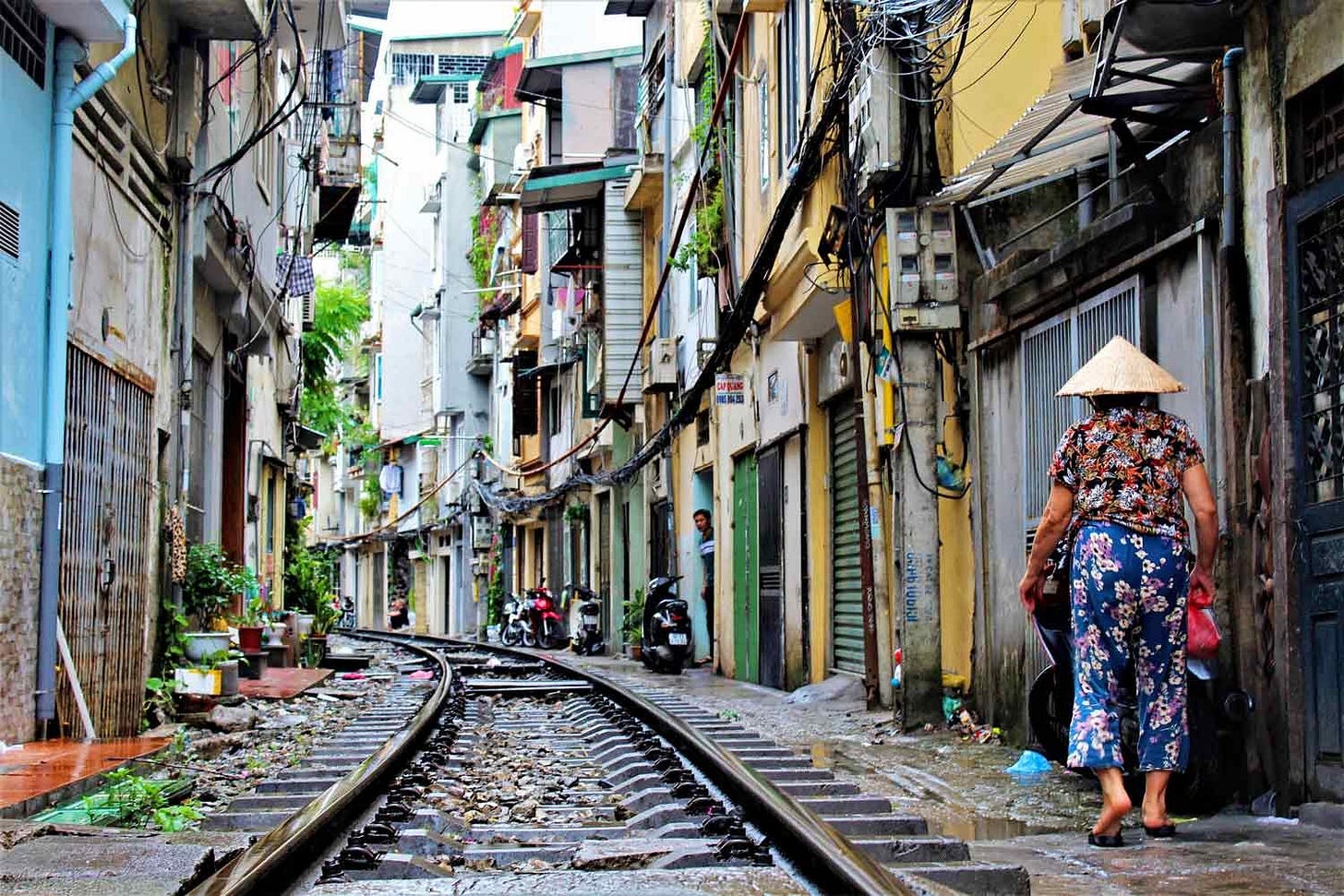
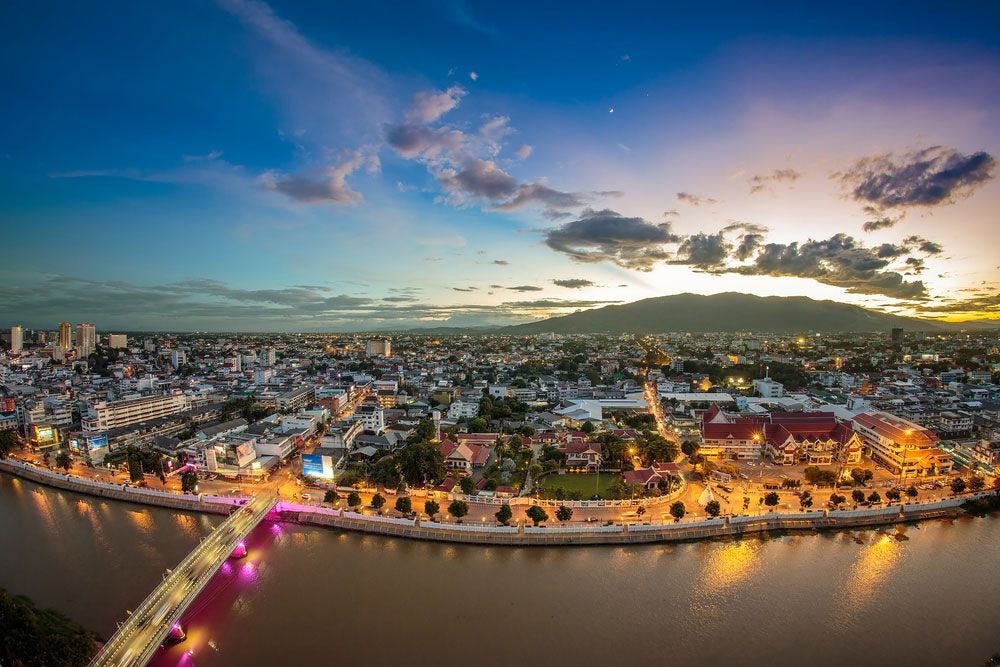
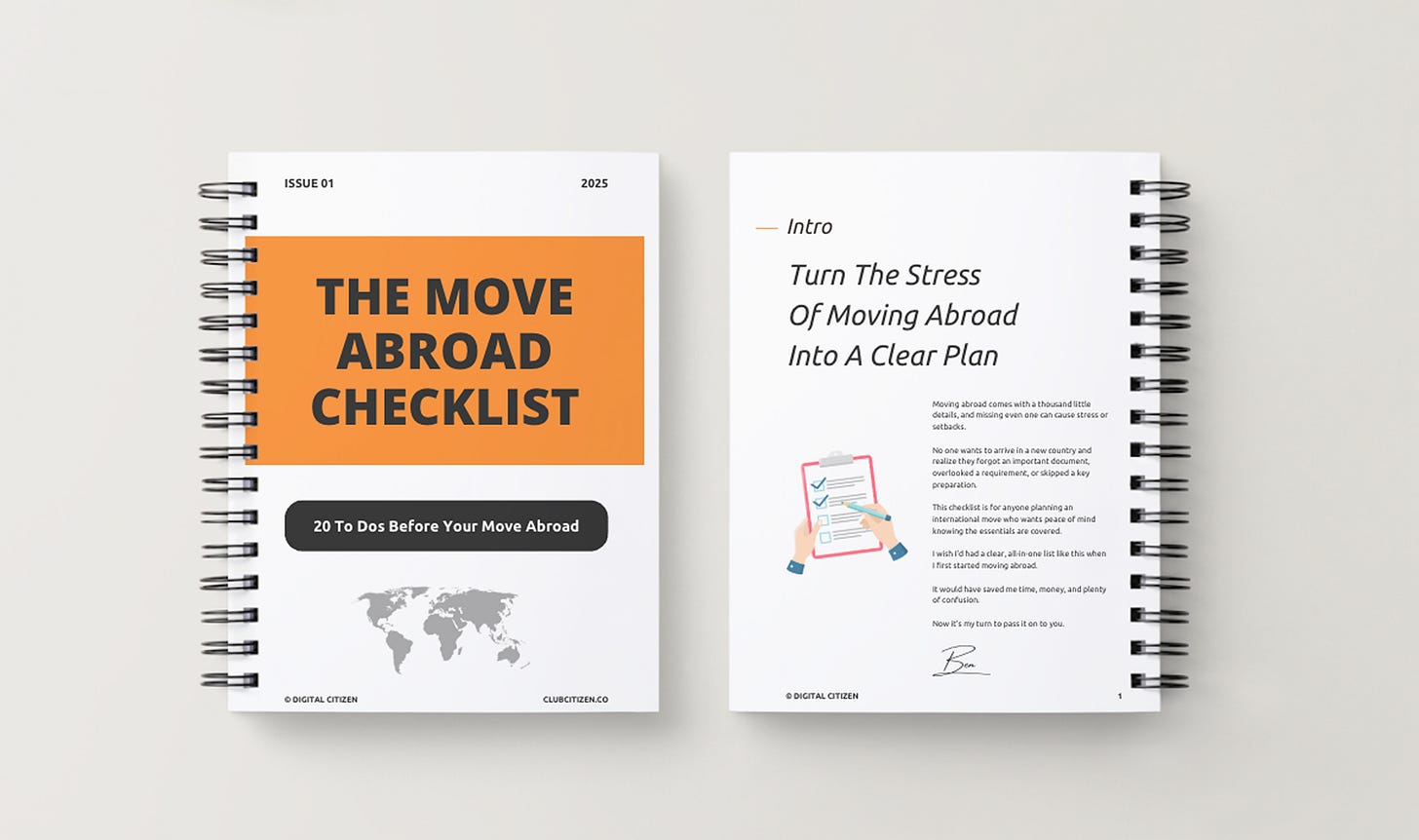
Ohh I lived in Lisbon for a while. Totally get why it made the list. I miss it soooo much
Thanks Benjamin - good insights which has halped me procees my thoughs!